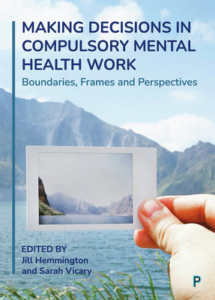One of the themes of this year’s Social Work Week, which begins today, is ‘Continuing professional development (CPD): the first 3 years’. Essential to the challenging Approved Mental Health Professional role, CPD in this area must include reflection on the viewpoints of those being deprived of liberty when detained in psychiatric hospitals, as well as those involved in the decision to keep them there.
The current review of mental health legislation in England and Wales marks the 40th anniversary of this legislation. Sanctioning statutory detention in psychiatric hospitals is possible in a range of countries under various mental health acts. Within the United Kingdom, statute differs across the four nations, although not radically, and there are overlapping statutory duties and key roles. In England and Wales, the Mental Health Act 1983 introduced the Approved Social Worker as a decision maker authorising statutory detention. As the name suggests, this role was undertaken by a qualified social worker, once approved to do so, and following a period of training.
There have been two significant changes to this legislation: first, amendments in 2007 opened the role to other allied health professionals (mental health nurses, occupational therapists and psychologists); and second that Approved Mental Health Professionals (AMHPs), as the role is now known, are required to undertake 18 hours of professional development to retain their approval status. However, unlike the initial approval training, the curriculum for reapproval of AMHPs is not guided by any regulated standards. It is also sometimes criticised for being too heavily weighted towards knowledge acquisition, especially about changes in law, at the expense of the development of skills such as critical reflection about decision making. Given that the crux of the AMHP role is to decide whether or not to deprive someone of their liberty, this gap is a concern. It is now, however, starting to be addressed.
For decades, research exploring the AMHP role, or its equivalent, has been dominated by findings of low morale, emotional exhaustion and experiences of fear and vulnerability. One aspect of these findings is that AMHPs report feeling unsupported with limited opportunities for formal supervision and debriefing. When combined with inconsistent approaches to continuing professional development or reapproval, it is perhaps unsurprising that the negative impact of decision making about detention is high risk, creating aspects of moral distress for those decision makers. But need this be so?
Inevitably informed by the prevailing social policy, calls for reflection through supervision, especially during initial and reapproval training, are now being recognised as forming the cornerstone of quality AMHP practice. AMHP services must also support the independence of AMHPs’ decision making, while ensuring that they have access to individual, peer and professional support, and enable them to explore their working practices in a safe manner, with timely debrief sessions supporting their ‘psychological safety’. Experience alone does not lead to learning but, rather, it is the deliberate reflection on that experience. Debriefing should be an interactive, bi-directional reflective conversation.
Recently, the focus on ongoing professional development has begun to include reflection across practice and personal boundaries, making the case that there are alternatives to rigid thinking. Adopting this approach is a form of practice wisdom in keeping with policy and statutory reforms. AMHPs should also explore the impact of trauma arising from compulsory detention and the way that this affects both the person deprived of liberty and themselves. People who work within – or experience – compulsory mental health work can enhance their understanding of their own and others’ frames of reference. This is critical reflection on and in practice and a call for continual professional development through conceptual reframing, bringing together perspectives from those with lived experience of involuntary detention and those whose research focuses on the frameworks and boundaries of decision making. The means that the AMHP role, and its equivalents, is not just seen as a functional, legalistic one. Recognising this is the first step to deliberate and deliberative decision making.
There is a need for all involved to pause and reflect on assessments and decision-making points. Assimilating these encounters into practice and understanding how they influence decision making can be one of the most challenging aspects of practice and professional development. Increasingly, academic literature seeks to explore the dilemmas at the heart of decision making. Our new book, Making Decisions in Compulsory Mental Health Work, acknowledges the role and purpose of continuing professional development. Various viewpoints, including of those with experience and knowledge of individuals who are directly involved with or subject to compulsion in mental health work, are now influencing continuing professional development in the first three years (and beyond).
Jill Hemmington is Senior Lecturer and Course Leader for the University of Central Lancashire AMHP programme and AMHP CPD. Sarah Vicary is Professor of Social Work and Mental Health, The Open University.
 Making Decisions in Compulsory Mental Health Work Edited by Jill Hemmington and Sarah Vicary is available on the Bristol University Press website. Pre-order here for £24.99.
Making Decisions in Compulsory Mental Health Work Edited by Jill Hemmington and Sarah Vicary is available on the Bristol University Press website. Pre-order here for £24.99.
Bristol University Press/Policy Press newsletter subscribers receive a 25% discount – sign up here.
Follow Transforming Society so we can let you know when new articles publish.
The views and opinions expressed on this blog site are solely those of the original blog post authors and other contributors. These views and opinions do not necessarily represent those of the Policy Press and/or any/all contributors to this site.
Image Hans Eiskonen via Unsplash


